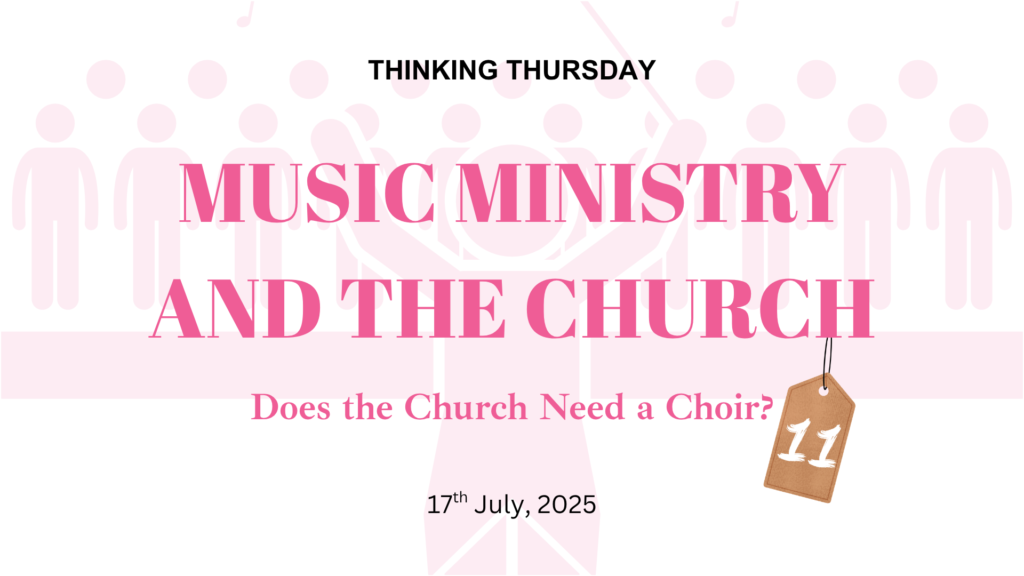What the Choir Should Look Like: Returning to God’s Pattern
Having looked at the purposes of music in the body of Christ, let us now look at what a choir should look like in the church.
First, we must avoid locking ourselves into the traditional idea of a “choir”—with uniforms, a stage presence, and a fixed schedule. That image can be a limitation. In many churches today, what we call “choirs” are often small music teams or worship bands. What matters is not the size, the uniform, or the label, but the spiritual function.
In the Bible, we don’t often see the word “choir”; rather, we see singers, musicians, and music teams.
“The singers went before, the players on instruments followed after” (Psalm 68:25).
David had leaders like Asaph, who were not just skilled singers but also prophetic leaders. “Moreover, David and the captains of the army separated for the service some of the sons of Asaph… who should prophesy with harps, stringed instruments, and cymbals” 1 Chronicles 25:1. The number didn’t matter; whether two or two hundred, they ministered to the Lord with music.
So, the church should emphasize singers and music ministers, rather than on having a “choir”.
A proper music team should not only serve during a special segment in the service. They should be sensitive and available to guide the church in musical worship as the Spirit leads the person overseeing the meeting. So at times, they can be singing in the background during spiritual warfare, healing sessions, etc.
READ ALSO: SUBMISSION IN MARRIAGE (PART 1)
Receiving New Songs
In some churches, those who have received new songs given by the Spirit lead the congregation in singing them when an unrehearsed song is received. They provide the backup, and guide the rest of the church on how to respond properly.
You may notice some of our songs (E.g., I Too Am a Warrior, He Knows Your Name, He’s a Good God, etc.) flow over from a known song to a new one. The reason we cut a good number of our spontaneous songs that way was for the purpose of assisting other churches to see and hear practically how new songs can be received, and how to respond.
So you may hear me on many occasions singing a song that is generally known, or known primarily to our congregation; and then, you hear a new song begin. Take note of how the backup singers join in, sometimes better than some, you might think it was rehearsed. But it was not. The singer is joining me – the leader, on the spur of the moment.
This is a pure example of the ministry of singers. David had people who could do this. You read it in the Psalms.
Extra Choir Work, Apart from Singing
It is also the responsibility of singers to take the spontaneous songs received during worship and work on them afterwards, stewarding what God has given properly by making it easily rememberable.
We must remember: music is not entertainment. The congregation isn’t clapping for singers—they are worshiping God. Music is ministry. It is prophecy. And those who lead it must be conscious of this sacred calling. When the Bible says, “Prophesy, one by one, that all may learn and all may be encouraged” (1 Corinthians 14:31), this includes prophetic music, which teaches, corrects, exhorts, and reveals.
So, Does the Church Really Need a Choir?
The answer is YES, but they are not to operate in the way many church choirs operate today.
The purpose of music in the church is not performance, but worship.
The music ministry is meant to teach, to admonish, and to allow the Word of Christ to dwell in us richly (Colossians 3:16). When you wrap the Word of God in melody, it becomes alive, sticks with you, and edifies you.
Spirit-led music ministers directly to others, not just to God. Therefore, music ministers must be deeply tuned to the Spirit, receiving lyrics and melodies that edify, teach, and prophesy to the body of Christ. Their role is not merely to lead songs, but to serve as vessels through whom God can build up His people.
Every choir member must know this: your position is a calling. A calling to teach, to prophesy, to heal, to edify—and above all, to glorify God.
Church Choir vs Global Platform
Being in the choir is not about whether you hold a microphone every Sunday or release albums. It’s about whether music consistently flows from your spirit. Whether you feel compelled to turn God’s Word into melody. That’s a sign of a calling.
“Having then gifts differing according to the grace that is given to us, whether prophecy, let us prophesy according to the proportion of faith…” Romans 12:6
You don’t have to be famous to be faithful. Just as a true preacher doesn’t need a global platform to obey God, neither does a music minister. The first calling is to serve in the house of God.
“Praise ye the Lord. Sing unto the Lord a new song, and his praise in the congregation of saints.” Psalm 149:1
Let us raise music ministers who don’t seek applause, but seek the heart of God. Who don’t desire fame, but long to serve in the house of the Lord. Let us wrap up the Word of God in melody and sing with grace in our hearts. Let us bring healing and deliverances, teach, and worship. That is why the church needs the music ministry.
When a music minister truly understands this, their entire posture changes. Preparation becomes deeper. Worship becomes sincere. Lyrics carry weight, and the impact on the congregation is eternal.
THE BEGINNING: MUSIC MINISTRY – DOES THE CHURCH NEED A CHOIR? (PT 1)
